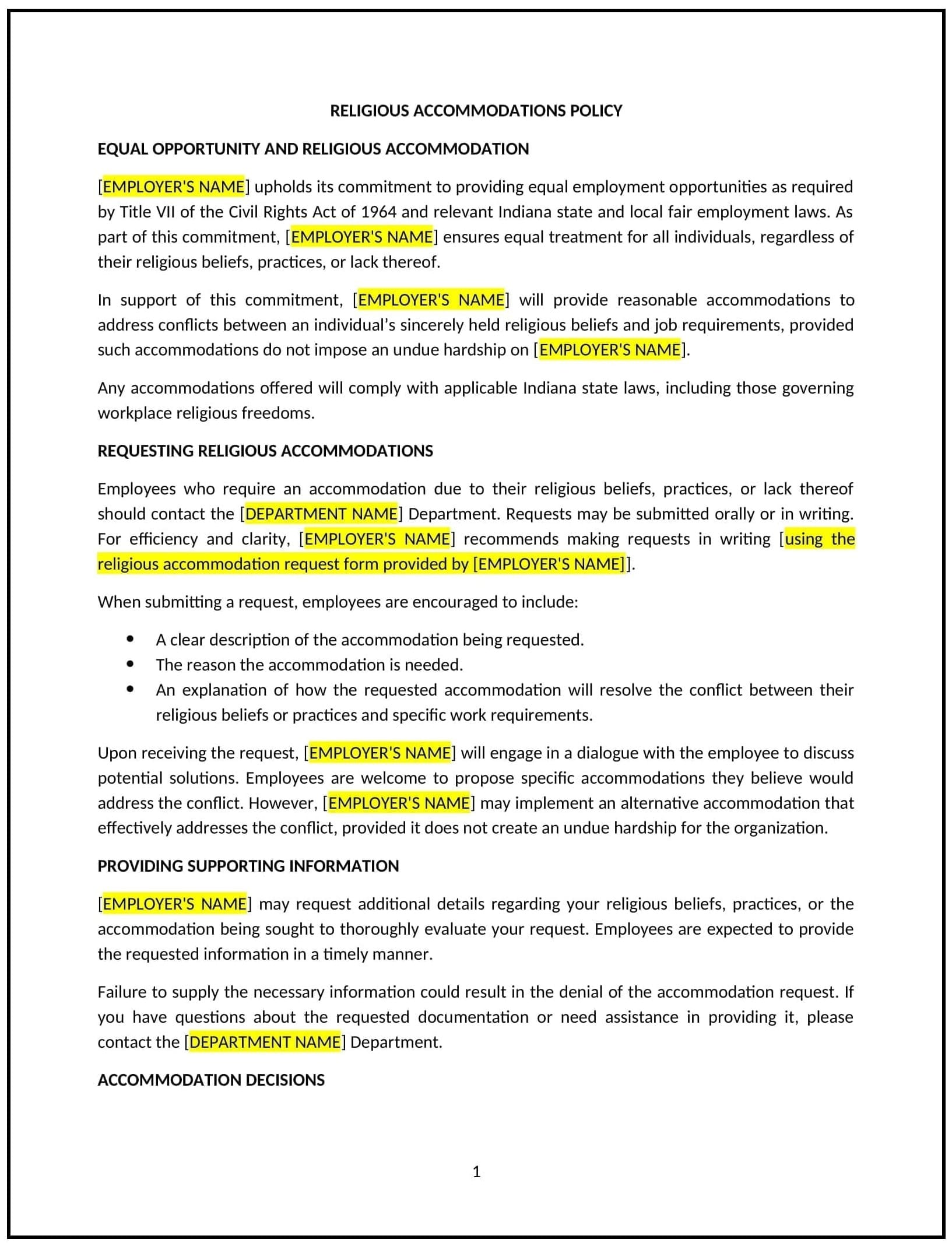Religious accommodations policy (Indiana): Free template
Got contracts to review? While you're here for policies, let Cobrief make contract review effortless—start your free review now.

Customize this template for free
Religious accommodations policy (Indiana): Free template
This religious accommodations policy helps Indiana businesses establish clear guidelines for addressing employees’ requests for religious accommodations in the workplace. It outlines procedures for evaluating and implementing accommodations while ensuring compliance with applicable state and federal laws. Whether managing scheduling adjustments, dress code exceptions, or prayer space requests, this policy supports businesses in fostering an inclusive and respectful work environment.
By implementing this policy, Indiana businesses can promote fairness, respect diverse religious practices, and ensure that reasonable accommodations are provided without undue hardship.
How to use this religious accommodations policy (Indiana)
- Identify accommodation needs: Provide employees with clear instructions for submitting requests for religious accommodations, including the information they need to provide and who to contact.
- Evaluate accommodation requests: Outline a consistent process for assessing accommodation requests to determine if they are reasonable and do not impose undue hardship on the business.
- Document the process: Require written documentation of all accommodation requests and the outcomes, including any agreed-upon adjustments or reasons for denial.
- Adjust work schedules: Include provisions for accommodating religious holidays or observances, such as flexible scheduling, shift swaps, or additional leave options.
- Address dress code exceptions: Specify how employees can request exceptions to dress codes or grooming standards for religious reasons, ensuring such accommodations are handled respectfully.
- Provide prayer or reflection spaces: Offer guidance on how to designate a quiet space for employees who request it for religious practices, when feasible.
- Train managers: Ensure managers are trained to handle religious accommodation requests professionally and without bias.
- Review and update regularly: Periodically review the policy to ensure it reflects changes in business operations or applicable Indiana laws.
Benefits of using this religious accommodations policy (Indiana)
Implementing this policy provides several key benefits for Indiana businesses:
- Supports inclusivity: Promotes a workplace culture that respects and accommodates diverse religious practices.
- Reduces legal risks: Helps businesses align with Indiana and federal laws on religious accommodations, minimizing the risk of discrimination claims.
- Enhances employee morale: Shows employees that their beliefs are respected, improving job satisfaction and retention.
- Encourages consistency: Establishes clear guidelines to ensure all accommodation requests are handled fairly and equitably.
- Improves workplace harmony: Reduces potential conflicts related to religious practices by setting clear expectations and processes.
- Demonstrates good faith efforts: Reflects the business’s commitment to respecting employees’ religious needs while maintaining operational efficiency.
Tips for using this religious accommodations policy (Indiana)
- Communicate the policy clearly: Share the policy during onboarding and make it easily accessible in the employee handbook to ensure employees understand their rights and responsibilities.
- Maintain confidentiality: Ensure that all religious accommodation requests and related discussions are kept confidential and shared only with those directly involved.
- Be proactive: Encourage employees to discuss accommodation needs early to allow time for evaluation and implementation.
- Balance needs and operations: Work collaboratively with employees to find accommodations that meet their religious needs without causing undue hardship to the business.
- Monitor implementation: Periodically review how accommodations are working to ensure they remain effective and practical for both the employee and the business.
- Stay updated on regulations: Regularly review state and federal laws regarding religious accommodations to ensure ongoing compliance.